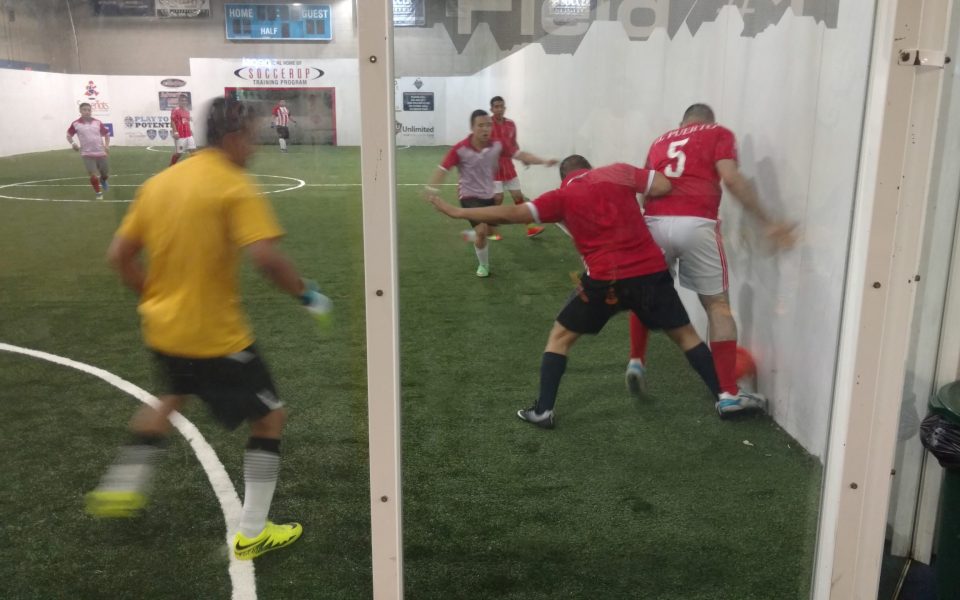Just after the witching hour on a humid June night, thick clouds slide quickly over Winston-Salem, hued pink by the city lights. Deep in the industrial sprawl that coils around North Point Boulevard, the sounds from the streets are soft. Distant traffic rumbles, and above one of a dozen buildings an American flag snaps in the wind. Tucked back in all the switched-off excess — the car dealership, the clothing outlet, the storage units — one building illuminates the sagging, oversized darkness. Just after midnight, two whistles blow within it.
And the Restaurant League’s second set of games has begun.
Every Tuesday and Wednesday night from May through July, the Winston-Salem Sportsplex stays open late for its Restaurant League. Now in its third year, the league provides an opportunity for restaurant workers in the Camel City and the surrounding area to come together and play an hour of indoor soccer each week. Most of the participants are Latino, and by nightfall the majority have spent their day — their entire day — waiting tables, washing dishes, cooking on the line.
Promptly at 9:30 p.m. on June 7, the workers at Domingo’s Mexican & Seafood Restaurant in Mocksville — a half-hour’s drive from the sportsplex — lock the door and close up as fast as they can. Domingo’s owner spurs their hasty closing — an unfamiliar concept to many restaurant workers.
“Let’s close, let’s go play!” encourages Gilberto, the owner at Domingo’s, who chose not to give his last name.
As on every game night, Gilberto and his workers rush to the sportsplex for their 11 p.m. kickoff — all of them, the owner included, excited to take the field. Not only did Gilberto pay the fees for the team’s entire roster at the beginning of the season, he joins them on the pitch.
“I’m 54 now, and no one has tried to stop me,” Gilberto says, laughing after the game.
Thick glass walls and high nets enclose two 98-by-44-foot turf pitches at the Winston-Salem Sportsplex. Spectators face the back of one the goals of each field, witness to the players’ powerful shots, many of which miss wide and crack against the glass like cannon fire. With its high, transparent barrier providing the fan an intimate display, indoor soccer is an aquarium.
In many ways, the walled-in game resembles hockey more than its traditional outdoor counterpart. Players at the sportsplex take advantage of the walls as if they were their most reliable teammates — using them to maneuver around a defender or fool the opposing keeper.
Unlike the long outdoor battles of lengthy possession and momentous goals, indoor soccer comes at a quicker pace. While it’s not uncommon for an outdoor contest to end scoreless, or in a decisive 1-0 victory, indoor games at the sportsplex can yield a 31-12 blowout, or a 16-15 nail-biter.

By 11:30 p.m. on June 7, players of the midnight matches begin sauntering in, quickly commenting on, chiding and sympathizing with the halftime scores of the earlier games. Across teams and restaurants, players know one another, bonded by their very professions through which the league began.
Nearly three years ago, Manuel Pereda founded the Restaurant League. After other leagues were already underway at the complex, people began to ask Pereda about an opportunity for restaurant workers: Those who loved the game but weren’t free until late into the night. Pereda started going to restaurants, talking with owners and workers, establishing team managers, making fliers and finally putting the league in place.
Over the years the league’s grown to 12 teams, and players enjoy one of the two games on Tuesdays or the four on Wednesdays. On those nights, the sportsplex remains open past 1 a.m.
Pereda knows the importance of the opportunity to play soccer, a rejuvenating idea even after long, 12-hour days behind a range, a sink or a register. He recognizes the uncertainty and fear that limits the lives of many of these players, and he knows his soccer league transcends it.
“It’s been really hard,” Pereda says of the political climate. “[The players] don’t talk about it, and if we talk about it it’s really fast… They just want to have fun. [Many] work from 10 to 10: 12 hours. They just come and want to release their stress.”
One player, Francisco Cruz, stands watching the midnight battles. Unlike most other spectators, he hasn’t just finished a game of his own. Cruz already played the night before; he came because he wanted to watch.
Within the darkness, there’s light in knowing that something stays open, waiting to welcome you in.
Join the First Amendment Society, a membership that goes directly to funding TCB‘s newsroom.
We believe that reporting can save the world.
The TCB First Amendment Society recognizes the vital role of a free, unfettered press with a bundling of local experiences designed to build community, and unique engagements with our newsroom that will help you understand, and shape, local journalism’s critical role in uplifting the people in our cities.
All revenue goes directly into the newsroom as reporters’ salaries and freelance commissions.





Leave a Reply